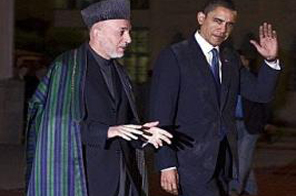Obama presses Karzai in surprise Afghan visit
KABUL: US President Barack Obama pressed Afghan leader Hamid Karzai to make progress in cleaning up corruption and rallied troops to defeat the Taliban during a surprise night-time visit to Afghanistan.
Obama flew in under the cover of darkness aboard Air Force One and left before dawn Monday in his first visit to the country since taking office more than a year ago.
The war against the Taliban, now in its ninth year, is claiming record fatalities among the 126,000 foreign troops in Afghanistan, where Obama is deploying reinforcements in an effort to end the war.
The visit -- which included briefings with US General Stanley McChrystal, the commander of foreign forces, and US ambassador Karl Eikenberry -- gave the president the chance to assess the progress of his new war strategy.
"We are here to help Afghans forge a hard-won peace while realising the extraordinary potential of the Afghan people," the US commander-in-chief said in a rousing speech to US and NATO troops at Bagram Airfield outside Kabul.
He pressed Karzai, returned for a second five-year term in fraud-riddled elections last year, to step up the fight against corruption and the drugs trade, and invited the Afghan leader to visit Washington on May 12.
Karzai has pledged action against corruption, which infects every aspect of life in Afghanistan, as well as good governance and rule of law.
Obama, whose relationship with Karzai has been strained, urged his Afghan counterpart to "continue to make progress" on all fronts. Related article: US public approves of Afghan strategy
The visit sent a clear message to Karzai that Obama expects him to act on promises to eradicate graft before visiting Washington but is deeply committed to reversing the Taliban insurgency, Afghan analysts said.
"Obama has set some homework for Karzai, reminding him that the anti-corruption issue must be taken more seriously and that not enough has been done so far," analyst Waheed Mujda told AFP.
The US president has put his personal stamp on what he calls a "war of necessity" in Afghanistan, with troop deployment to hit 150,000 by August.
"It was a strong message to President Karzai and his administration that the US cannot remain indifferent to the internal politics in Afghanistan," said Haroun Mir, director of Afghanistan's Centre for Research and Policy Studies.
"I am sure before he goes to Washington in May he will have to take some proper measures to show that he has the intention and the political will to create some changes."
NATO's civilian representative to Afghanistan, Mark Sedwill, said the message to Karzai was "all about delivery".
The international community's commitment to Karzai "must be repaid with delivery right down to the grass roots, where people are looking for decent policing, decent justice, schools and hospitals," he told the BBC.
"There is a renewed sense of commitment and a renewed momentum, but in the end it's all about delivery."
After dining with Karzai at the presidential palace in Kabul, Obama donned a leather bomber jacket to tell cheering troops at Bagram he was confident they would stop the Taliban from regaining power and halt Al-Qaeda.
"Our strategy includes a military effort that takes the fight to the Taliban while creating the conditions for greater security and a transition to the Afghans," he told US and NATO troops.
Bagram, the biggest US base in Afghanistan, came under mortar fire after the president's departure, a NATO spokesman said, adding there were no casualties.
Obama's visit coincided with a Washington Post poll that said 53 percent of Americans approve of how he is handling the situation in Afghanistan.
The first offensive of Obama's sweeping new strategy is unfolding in Helmand province, with Taliban strongholds in Kandahar among future targets in the south, where the insurgency is concentrated.
In his speech, he pointed to successes including flushing the Taliban out of a stronghold in Helmand's Marjah region, recent strikes against Al-Qaeda leaders and Pakistan's help in cracking down on militant hideouts.
The death of a NATO soldier on Monday brought to 137 the number of foreign troops to die in the Afghan war this year, compared to 78 in the first three months of 2009.






